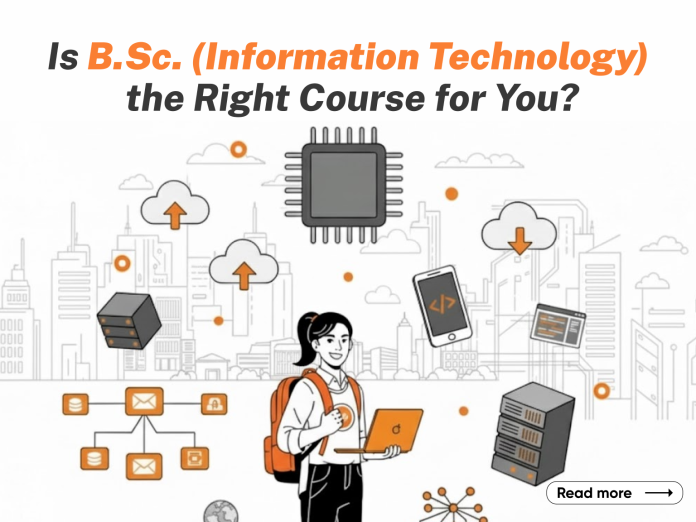- Why Choosing the Right Course Matters?
- What Is B.Sc. Information Technology (IT)?
- Who Should Consider B.Sc. Information Technology (IT)?
- Why Is IT a Game-Changer in Today’s World?
- What Skills Will You Develop During the Programme?
- What Job Roles Are Best Suited After B.Sc. Information Technology (IT)?
- Future of IT Industry: Where Does B.Sc. Information Technology (IT) Fit In?
- Options for Postgraduate Studies in IT and Beyond
- How to Decide If B.Sc. Information Technology (IT) Matches Your Career Goals?
- Alumni Success Stories
- Final Words
- Frequently Asked Questions (FAQs)
Why Choosing the Right Course Matters?
The moment you decide on your next course, you’re actually shaping the path of your future. Choosing the right undergraduate programme is not just about earning a degree, it’s about building a career that keeps you relevant in a fast-changing, technology-driven world. Many students often rush into traditional programmes without considering where the industry is headed, only to realize later that they could have explored far more dynamic and future-ready options.
This is where choosing an IT course like B.Sc. Information Technology (IT) can truly make a difference. In today’s digital-first age, businesses across every industry, be it healthcare, education, finance, or entertainment, depend heavily on technology to function efficiently. From building apps to managing data and securing networks, IT professionals are the backbone of modern organizations. That’s why understanding the B.Sc. Information Technology (IT) importance is crucial for any student who wants to stay ahead of the curve.
When you decide to study B.Sc. Information Technology(IT), you’re not just signing up for a degree, you’re choosing a career that evolves with technology itself. This programme equips you with the essential skills needed to thrive in the digital world, including programming, data handling, networking, and cybersecurity. It blends theoretical knowledge with practical learning, ensuring you can apply classroom concepts to real-world challenges.
Moreover, what makes this course even more exciting is its flexibility. Whether you dream of developing software, analyzing data, or leading IT projects, a B.Sc. Information Technology (IT) programme helps you explore multiple career pathways while strengthening your technical foundation. With the world becoming more digitized every day, skilled IT professionals are no longer optional, they’re essential.
Universities like Lovely Professional University (LPU) make this journey even more impactful. The programme at LPU emphasizes hands-on learning through projects, internships, and real-time industry exposure, giving students a strong head start in their professional lives. From state-of-the-art computer labs to mentorship from industry experts, everything is designed to prepare learners for global opportunities.
| Did You Know?
Choosing the right course after 12th sets the foundation for your entire career — studies show that students who align their education with their interests and strengths are 3 times more likely to succeed and stay satisfied in their professional lives! |
What Is B.Sc. Information Technology (IT)?
The B.Sc. in Information Technology (IT) programme is a three-year undergraduate degree designed to prepare students for the dynamic world of computing, software, and digital systems. Unlike traditional science courses that focus mainly on theoretical learning, this programme emphasizes practical skills and technical expertise that are essential in today’s tech-driven world. The B.Sc. Information Technology (IT) overview highlights how this degree blends computer science fundamentals with real-world applications, making it perfect for students who are curious about how technology shapes modern businesses and society.
When exploring the IT degree details, students will find that this course covers a wide range of subjects such as programming, database management, networking, cybersecurity, and data analytics. Throughout the three years, learners gain not just classroom knowledge but also the opportunity to work on hands-on projects that help them apply what they’ve learned. They become familiar with multiple programming languages like C, C++, Java, and Python while also exploring how to design databases, manage networks, and create websites or applications. In short, this course turns students into versatile professionals capable of solving real-world IT problems.
The B.Sc. Information Technology (IT) programme structure typically consists of six semesters, each introducing progressively advanced topics along with lab sessions, workshops, and internship opportunities. Students are trained in database management systems to understand how data is stored and retrieved efficiently, while networking and cybersecurity modules help them learn how to build and protect IT infrastructures. Courses in web development and user interface design introduce them to creating interactive and user-friendly platforms. Additionally, subjects like cloud computing and data analytics teach students how businesses use technology and data to make smarter decisions.
One of the biggest strengths of this programme is its focus on practical learning. Through live projects, research assignments, and case studies, students gain valuable exposure to the industry and learn how to apply their skills effectively. Whether you dream of becoming a software developer, data analyst, IT consultant, or cybersecurity expert, this course gives you the foundation to excel in any area of information technology.
| Did You Know?
B.Sc. Information Technology (IT) graduates are among the top 5 most employable professionals in India’s tech sector — with opportunities spanning software development, data analytics, cybersecurity, and cloud computing across industries worldwide! |
Who Should Consider B.Sc. Information Technology (IT)?
When it comes to choosing a course that will shape your professional future, it’s not just about what’s trending, it’s about what fits you best. Before you dive into any programme, it’s important to ask: “Does this match my skills, interests, and goals?” The B.Sc. Information Technology (IT) programme is perfect for students who are fascinated by the digital world, love exploring how technology works behind the scenes, and enjoy solving logical problems. If you’ve ever been curious about how websites are built, how apps communicate with servers, or how cybersecurity keeps data safe, this might be the ideal course for you.
The B.Sc. Information Technology (IT) eligibility generally includes students who have completed their 10+2 with subjects like Mathematics, Computer Science, or Physics. However, what truly matters more than just eligibility is your mindset. You don’t have to be a coding expert before joining the course, what you really need is curiosity, creativity, and a willingness to learn how technology shapes businesses and daily life.
Ideal Candidates for B.Sc. Information Technology
- Students passionate about computers and technology:
If you’ve always been the one who enjoys exploring new apps, understanding how gadgets work, or trying to fix technical issues, then this course will feel exciting rather than challenging. The B.Sc. Information Technology (IT) programme helps turn that passion into professional skills. - Analytical and problem-solving thinkers:
Do you enjoy solving puzzles or logical problems? Then you already have one of the most valuable qualities for this field. B.Sc. Information Technology (IT) teaches you to use logic, analysis, and structured thinking to build efficient software and technological solutions. - Creative digital explorers:
Technology isn’t just about codes, it’s also about creativity. If you’re someone who loves designing websites, creating digital solutions, or thinking of innovative ideas to improve online systems, B.Sc. Information Technology (IT) allows you to combine creativity with technical skills. - Students aiming for a future in tech or business:
If your goal is to work in the IT industry, become a web or app developer, or even start your own tech-driven business someday, this course provides the right foundation. The B.Sc. Information Technology (IT) programme gives you the skills to work in both tech companies and non-technical industries that rely on technology every day, from education and healthcare to finance and media. - Learners who want flexibility and global opportunities:
Unlike some specialized degrees that limit your options, a B.Sc. Information Technology (IT) opens doors globally. Whether you plan to pursue higher education, freelance, or work with international clients, this degree builds universal skills that are in demand everywhere.
When considering who should study IT, remember that this course isn’t only for hardcore coders or math lovers, it’s for anyone who enjoys innovation, wants to understand how technology drives the world, and is ready to adapt to fast-changing digital trends. Students who are open-minded, eager to learn, and comfortable experimenting with new software tools are likely to thrive in this field.
In short, the B.Sc. Information Technology (IT) programme is for those who are curious about the future, ready to take on challenges, and excited about turning ideas into digital realities.
Why Is IT a Game-Changer in Today’s World?
In this rapidly evolving digital era, Information Technology (IT) is the heartbeat of almost every modern industry. The IT industry impact can be seen everywhere, from small startups using cloud tools to manage their teams, to global corporations running AI-powered systems that handle millions of customers daily. For students pursuing a B.Sc. Information Technology (IT), this means stepping into a world that’s not just evolving but constantly redefining how the world functions.
The importance of Information Technology in modern careers goes beyond coding or fixing computers. IT has become a key enabler of progress, it powers innovation, fuels data-driven decisions, and opens up limitless opportunities for professionals across every field. No matter which industry you choose, IT skills ensure you stay relevant and future-ready.
How IT Is Changing the Game
- Powering Digital Transformation: Every industry, from healthcare to finance, is adopting digital tools, making IT professionals essential to manage and innovate systems.
- Global Connectivity: IT bridges geographical boundaries, enabling global collaboration, online learning, and international career growth.
- Driving Smarter Businesses: Data analytics, cloud computing, and cybersecurity help companies work efficiently and make informed business decisions.
- Innovation Everywhere: From mobile apps to artificial intelligence, IT drives innovation, making life simpler, faster, and smarter.
- Future-Ready Careers: With technology advancing every day, B.Sc. Information Technology (IT) graduates are among the most sought-after professionals worldwide.
IT in Action Across Industries
| Industry | IT Industry Impact | Career Opportunities |
| Healthcare | Electronic health records, telemedicine, and AI-based diagnostics improving patient care | Health IT Specialist, Data Analyst, System Administrator |
| Finance | Digital payments, cybersecurity, and fraud prevention systems | Financial Data Analyst, Cybersecurity Expert, IT Auditor |
| Education | Online learning platforms, virtual classrooms, and e-learning analytics | EdTech Developer, LMS Administrator, IT Support Engineer |
| E-commerce | Website development, digital marketing automation, and data-driven sales | Web Developer, E-commerce Analyst, Digital Strategist |
| Manufacturing | Automation, robotics, and Internet of Things (IoT) integration | IT Process Engineer, IoT Specialist, Network Manager |
| Media & Entertainment | Cloud-based streaming, video editing tools, and content management systems | Multimedia Developer, Cloud Engineer, Technical Producer |
Why It Matters for B.Sc. Information Technology (IT) Students
For students pursuing B.Sc. Information Technology (IT), understanding how technology transforms industries gives a massive advantage. You’re not just learning technical concepts, you’re preparing to shape the future of work. The B.Sc. Information Technology (IT) relevance lies in its versatility, you can fit into roles in business, creative industries, government, or even start your own tech venture.
The IT field doesn’t just offer jobs; it offers a world of innovation, flexibility, and lifelong learning. Whether you dream of becoming a developer, analyst, or entrepreneur, your IT foundation ensures you’ll always have a place in tomorrow’s world.
| Did You Know
Over 90% of businesses worldwide rely on IT to operate, communicate, and grow — making Information Technology the driving force behind today’s global innovation, digital transformation, and smarter everyday living! |
What Skills Will You Develop During the Programme ?
The B.Sc. Information Technology (IT) programme is more than just learning computers, it’s about gaining a complete set of skills that prepare you for the real world. From technical expertise like coding and database management to soft skills such as communication and teamwork, the course ensures that every student graduates as a well-rounded IT professional.
Whether you want to become a software developer, data analyst, or cybersecurity expert, these B.Sc. Information Technology (IT) skills will give you the foundation to grow confidently in your chosen path. Let’s take a closer look at what you’ll actually learn during the journey.
1. Technical Skills You’ll Master
- Programming Expertise: Learn multiple programming languages such as Python, Java, C++, and JavaScript to design apps, software, and dynamic web platforms.
- Database Management: Understand how to organize, secure, and retrieve data efficiently using SQL, Oracle, and cloud-based systems.
- Networking Skills: Build strong knowledge of network architecture, configuration, and security to manage seamless digital connectivity.
- Cybersecurity Skills: Learn how to protect data, systems, and networks from cyber threats using ethical hacking and advanced security tools.
- Cloud Computing: Explore cloud platforms and understand how modern businesses rely on cloud services for storage, scalability, and efficiency.
- Web and App Development: Develop interactive websites and mobile apps while applying principles of UX/UI design.
2. Soft Skills You’ll Strengthen
- Analytical Thinking: Learn to analyze data, identify problems, and develop logical solutions.
- Communication & Collaboration: Work in team projects, present ideas clearly, and collaborate effectively — skills that every employer values.
- Adaptability: The IT industry changes fast, and this programme helps you adapt to new tools, platforms, and challenges with ease.
- Time Management & Leadership: Learn to handle deadlines, lead group tasks, and manage projects like a professional.
3. How These Skills Shape Your Career
These technical and soft skills in IT make you ready for both employment and entrepreneurship. You’ll be able to design software, manage networks, protect systems from hackers, and contribute to digital innovation. The balance of coding, communication, and creativity makes you not just an IT graduate, but a problem-solver who’s ready for any challenge the tech world brings.
| Did You Know?
During a B.Sc. Information Technology (IT) programme, students build a powerful mix of technical, analytical, and creative skills — from coding and data analysis to cybersecurity and teamwork — making them some of the most versatile professionals in the digital industry! |
What Job Roles Are Best Suited After B.Sc. (IT)?
The best thing about pursuing a B.Sc. in Information Technology is that it opens multiple doors, from coding and database management to cybersecurity and cloud computing. The programme equips students with both technical and problem-solving skills, allowing them to choose from a range of exciting and in-demand roles.
Here are some of the top B.Sc. Information Technology (IT) career options you can explore after completing your degree:
Software Developer
- What You Do: Design, code, and maintain applications or software systems for businesses and users.
- Key Skills: Programming (Python, Java, C++), debugging, and software testing.
- Why It’s Great: High demand across industries with flexible work setups, including remote and freelance opportunities.
Network Engineer
- What You Do: Set up, manage, and secure networks that keep organizations connected.
- Key Skills: Networking protocols, server management, and cloud integration.
- Why It’s Great: A critical role in every IT environment, offering great growth in cybersecurity and cloud careers.
Database Administrator
- What You Do: Manage, secure, and maintain large sets of company data using platforms like SQL and Oracle.
- Key Skills: Data organization, database security, and performance optimization.
- Why It’s Great: High job stability and demand across finance, healthcare, and e-commerce sectors.
Web Developer
- What You Do: Build responsive websites and digital platforms using HTML, CSS, JavaScript, and frameworks.
- Key Skills: Front-end and back-end development, UX/UI design, creativity.
- Why It’s Great: Perfect blend of technology and creativity, ideal for innovative minds.
IT Support Specialist
- What You Do: Troubleshoot and resolve hardware, software, or network issues for organizations.
- Key Skills: Technical troubleshooting, communication, and system maintenance.
- Why It’s Great: Great entry-level job after IT degree that builds practical experience and confidence.
Cybersecurity Analyst
- What You Do: Protect systems from cyber threats and ensure data privacy and network safety.
- Key Skills: Ethical hacking, risk assessment, and digital forensics.
- Why It’s Great: One of the most in-demand IT roles for graduates with high-paying global opportunities.
Data Analyst
- What You Do: Analyze and interpret data to help businesses make better decisions.
- Key Skills: Excel, SQL, Python, Power BI, and statistical thinking.
- Why It’s Great: A high-growth career where insights drive real business impact.
Cloud Administrator
- What You Do: Manage cloud-based storage, servers, and systems using AWS, Google Cloud, or Azure.
- Key Skills: Cloud management, virtualization, and system scalability.
- Why It’s Great: One of the fastest-growing tech fields as companies shift toward cloud infrastructure.
In short, B.Sc. Information Technology (IT) graduates can choose from a wide spectrum of careers, whether as a software developer, network engineer, data analyst, or cybersecurity professional. The opportunities are limitless, and your skills can make you a valuable player in the digital transformation era.
| Did You Know?
The IT industry hires thousands of B.Sc. Information Technology (IT) graduates every year for roles across software, data, cloud, and AI — and many of these positions offer faster career growth and higher starting salaries than most other graduate fields! |
Future of IT Industry: Where Does B.Sc. Information Technology (IT) Fit In?
The IT world is growing faster than ever, from AI-powered systems and cybersecurity innovations to cloud platforms and data-driven decision-making. The good news? A B.Sc. in Information Technology perfectly aligns with these changes, preparing students for both current and future career demands.
Here’s how the IT industry trends are shaping up and where B.Sc. Information Technology (IT) graduates fit in:
| Emerging Trend In IT | What It Means for B.Sc. Information Technology (IT) Graduates | Future Career Scope |
| Artificial Intelligence & Automation | With knowledge of programming and data handling, B.Sc. Information Technology (IT) graduates can build intelligent systems and automation tools. | AI Developer, Data Analyst, Automation Specialist |
| Cybersecurity & Data Protection | Rising cyber threats mean greater demand for experts who can secure networks and protect digital data. | Cybersecurity Analyst, Ethical Hacker, IT Security Consultant |
| Cloud Computing & Virtualization | Businesses are moving to cloud-based systems, creating new opportunities for cloud administrators and architects. | Cloud Engineer, DevOps Professional, System Administrator |
| Big Data & Analytics | Organizations rely on insights for smarter decisions — B.Sc. Information Technology (IT) graduates skilled in analytics tools are in demand. | Data Analyst, BI Expert, Data Engineer |
| Internet Of Things (IOT) | With connected devices everywhere, IT professionals play a key role in developing and managing IoT networks. | IoT Developer, Embedded Systems Engineer |
| Blockchain & FinTech Innovations | Knowledge of databases and security helps graduates enter fields like digital finance and blockchain tech. | Blockchain Developer, Crypto Analyst |
| Web 3.0 & Metaverse Development | B.Sc. Information Technology (IT) students skilled in web design, graphics, and virtual technologies can contribute to immersive digital experiences. | Web Developer, AR/VR Specialist |
| Sustainable Tech & Green IT | The IT industry is focusing on eco-friendly technologies and efficient systems. | Green IT Consultant, Cloud Efficiency Expert |
Why It Matters
- The B.Sc. Information Technology (IT) career scope is expanding beyond traditional roles, now touching every sector from healthcare and finance to entertainment and education.
- With the right skills, graduates can easily shift into trending areas like AI, cloud computing, and cybersecurity, all high-paying and future-proof fields.
- The future prospects in Information Technology aren’t limited by geography; remote work and global tech projects are redefining how and where professionals work.
Options for Postgraduate Studies in IT and Beyond
Completing your B.Sc. Information Technology (IT) is just the beginning, the real journey starts when you decide how to take your knowledge further. The good news? IT graduates today have a wide range of options for higher studies after B.Sc. Information Technology (IT), from advanced technical degrees to global management programmes, depending on where they see their career heading.
Many students choose to strengthen their technical expertise through postgraduate IT programmes, while others expand their horizons with management or international study options. Let’s explore some of the most promising paths after B.Sc. Information Technology (IT) that can help you build a successful and future-ready career.
1. M.Sc. IT – Deep Dive into Technology
If you’re passionate about coding, database systems, and emerging technologies, pursuing an M.Sc. IT is one of the best choices for higher studies after B.Sc. Information Technology (IT).
This programme focuses on advanced computing concepts like data analytics, cloud architecture, and artificial intelligence, giving you both theoretical depth and practical exposure.
At Lovely Professional University (LPU), the M.Sc. IT programme is designed to align with modern industry demands, ensuring students gain hands-on experience through real-world IT projects, internships, and research-based learning.
Career advantage: Opens doors to roles such as Software Engineer, Data Analyst, Cloud Developer, or Research Associate in the IT field.
2. Tech-Integrated MBA Programmes – Blend Technology with Business
For students who want to combine technology with leadership and strategy, these MBA programmes offer the perfect balance between business and innovation.
They teach how to manage IT projects, handle digital transformation, and make data-driven business decisions.
LPU’s tech-integrated MBA options—like MBA in Business Analytics, MBA in Data Science & Artificial Intelligence, and MBA in Fintech & Artificial Intelligence—equip students with a powerful mix of managerial and technical skills, preparing them for dynamic roles in global organizations where technology drives business growth.
Career advantage: Ideal for becoming an IT Project Manager, Business Analyst, or Digital Transformation Consultant.
3. IT Certifications – Quick Skill Enhancement
Not everyone wants to pursue a long-term postgraduate degree — and that’s where IT certifications come in.
These short-term programmes are globally recognized and help you specialize in specific areas of your interest. Some of the most popular certifications include:
- AWS Cloud Practitioner or Architect – For cloud computing professionals.
- Cisco CCNA / CCNP – For aspiring network engineers.
- Certified Ethical Hacker (CEH) – Perfect for those passionate about cybersecurity.
- Google Data Analytics, Power BI, or Tableau – For students who love data visualization and analytics.
Career advantage: These certifications make you job-ready faster and give you a competitive edge in the IT market.
4. Global IT Education Opportunities
For students who dream of studying abroad, there are several global IT education opportunities after graduation.
Countries like Canada, the USA, Germany, and Australia offer specialized Master’s programmes in IT, data science, and software engineering, giving you a global edge in the technology domain.
Even in India, Lovely Professional University (LPU) provides global exposure through credit transfer programmes and international university tie-ups, allowing students to pursue part of their studies abroad and gain real-world international experience.
Career advantage: A global education not only enhances your professional network but also improves your chances of landing high-paying international IT roles.
Quick Tip
Whether you choose an M.Sc. IT, Tech-Integrated MBA Programmes, or professional IT certifications, your choice should align with your career vision. If you love solving technical challenges, specialization through M.Sc. IT or certifications is the best route. But if leadership and management excite you, an MBA in IT from a reputed institution like LPU can help you move ahead faster in your career.
How to Decide If B.Sc. Information Technology (IT) Matches Your Career Goals?
Choosing a career path is one of the biggest decisions you’ll ever make, and when it comes to choosing B.Sc. Information Technology (IT), the key is understanding how well it aligns with your interests, skills, and future ambitions. Information Technology isn’t just about coding or computers; it’s about how technology shapes the world around us, from the apps we use daily to the systems that power entire industries.
Before jumping in, ask yourself what truly excites you. Do you enjoy problem-solving, building digital solutions, or understanding how systems work behind the scenes? If yes, then career alignment with IT degree could be a natural fit for you. The B.Sc. Information Technology (IT) programme opens doors to multiple fields, from software development and cybersecurity to data analytics and networking, allowing you to explore various roles before choosing your specialization.
However, it’s important to go beyond just the fascination for technology. Think about where you see yourself in the next 5 to 10 years. If your dream career involves working with innovation, automation, or digital business transformation, then this degree will provide the foundation you need. But if you’re looking for more people-oriented roles like project management or digital marketing, you can still benefit from IT knowledge by combining it with business or design-oriented skills later on.
Here’s some practical IT career guidance for students –
- Understand your strengths: If logical thinking, creativity, and problem-solving excite you, IT can be your perfect match.
- Explore future trends: Look into emerging areas like Artificial Intelligence, Cloud Computing, and Cybersecurity, all of which welcome B.Sc. Information Technology (IT) graduates.
- Talk to professionals: Connect with seniors, mentors, or alumni who’ve already pursued the degree to understand real-world career outcomes.
- Evaluate your learning style: The B.Sc. Information Technology (IT) course involves both theory and hands-on projects. If you enjoy practical learning, this field will keep you engaged.
- Think long-term: This course builds a strong base for advanced studies such as M.Sc. IT or MBA in IT, helping you grow faster in your career.
Ultimately, choosing B.Sc. Information Technology (IT) is not just about selecting a subject, it’s about setting a direction for your professional growth. With the right mindset, consistent learning, and curiosity to explore new technologies, you can transform this degree into a rewarding, future-proof career path.
| Did You Know?
Students who choose career paths aligned with their skills and interests — like pursuing B.Sc. Information Technology (IT) for tech-focused careers — are 40% more likely to achieve long-term job satisfaction and faster professional growth in the digital industry! |
Alumni Success Stories
At Lovely Professional University (LPU), success is not just measured by grades but by how students turn their knowledge into real-world achievements. The university’s emphasis on innovation, hands-on learning, and global exposure has helped B.Sc. Information Technology (IT) students transform their classroom experiences into remarkable career milestones. These B.Sc. Information Technology (IT) alumni achievements truly reflect the power of skill-based learning and mentorship at LPU.
- Taking innovation to the global stage, LPU students represented India among 1500+ competitors from 60+ countries at the prestigious World Skills Competition, establishing their place among the world’s best young innovators.
These success stories of IT graduates show how LPU nurtures holistic development, blending academics, creativity, and global exposure. Each of these inspiring IT career journeys is a reflection of how B.Sc. Information Technology (IT) students are not only mastering technology but also shaping a future driven by innovation, leadership, and global competence.
Final Words
In B.Sc. Information Technology (IT) conclusion, one thing becomes clear, choosing this programme is not just about studying computers; it’s about preparing yourself for a world built on technology and innovation. The benefits of studying Information Technology go far beyond the classroom, from mastering programming and cybersecurity to understanding how data, networks, and AI drive modern industries. This degree equips students with the skills and confidence to adapt, lead, and grow in a digital-first world.
The B.Sc. Information Technology (IT) programme opens doors to endless possibilities, whether you want to become a software developer, data analyst, cybersecurity expert, or even start your own tech venture. With continuous advancements in technology and the rise of automation, the demand for skilled IT professionals is only getting stronger.
In short, if you’re looking to build a future-ready IT career, this programme provides the perfect foundation to stay ahead in a fast-changing digital era. It’s more than a degree, it’s your launchpad to innovation, opportunity, and lifelong success in the world of technology.
Frequently Asked Questions (FAQs)
- What is the main focus of a B.Sc. Information Technology (IT) degree?
This is one of the most common queries on IT degree programmes. The B.Sc. in Information Technology focuses on computer systems, software development, networking, and data management. It prepares students for technical roles in the IT industry by combining theory with hands-on practical learning. - What are the career opportunities after completing a B.Sc. Information Technology (IT)?
Graduates can explore a wide range of roles, including software developer, system analyst, web designer, data analyst, and network engineer. These Information Technology course questions often highlight that IT graduates have opportunities across multiple sectors, from startups to global tech companies. - Is B.Sc. Information Technology (IT) suitable for students without a computer background?
Yes! The course starts with foundational subjects, making it accessible for beginners. Over time, students build strong technical, analytical, and problem-solving skills. That’s why many B.Sc. Information Technology (IT) FAQs mention that passion for technology is more important than prior coding experience. - What is the duration and structure of the B.Sc. Information Technology (IT) programme at LPU?
At Lovely Professional University (LPU), the B.Sc. Information Technology (IT) is typically a three-year undergraduate programme structured with both core and elective subjects. It includes lab work, projects, internships, and opportunities for certification to enhance employability. - Why should I choose LPU for pursuing B.Sc. Information Technology (IT)?
LPU is known for its industry-driven curriculum, strong placement record, and global learning exposure. The university blends technical training with soft skill development, helping students prepare for future-ready IT careers. These are key highlights often mentioned in Information Technology course questions by aspiring students.



![Career Paths after B.Sc. Information Technology [Lateral Entry] Career Paths after B.Sc. Information Technology](https://www.lpu.in/blog/wp-content/uploads/2025/12/Career-Paths-after-B.Sc_.-Information-Technology-218x150.jpeg)










